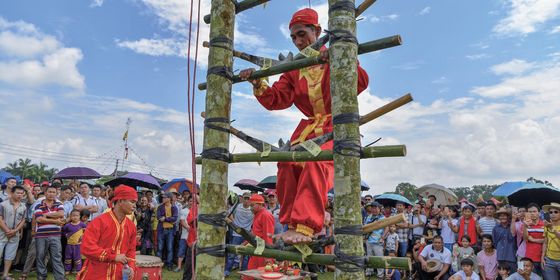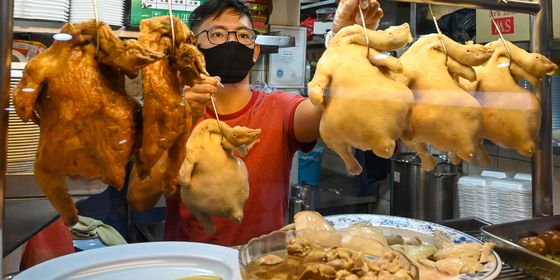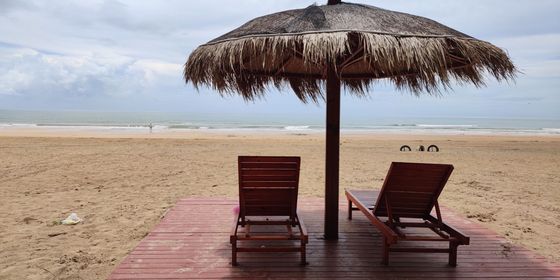The dreams and disillusionment of a coffee town’s Southeast Asian immigrants
Continued from part one.
Xinglong was very different from their original countries. Young people who had grown up in cities found themselves in a wild jungle. There were no roads, no homes; they had to start from scratch.
Du married a Vietnamese Chinese girl and had two sons. “We had little food back then. In order to buy a chicken for my boys, I had to bike 100 kilometers to the town closest to us,” Du recalls. “It would take me a whole day to buy a chicken.” Even though the land of Hainan was extremely fertile, planting vegetables or raising farm animals without approval from the government was strictly forbidden until 1978. All their private possessions were confiscated and became community property. Necessities—rice, meat, oil, cloth—were distributed with ration tickets. They, too, went through starvation during the Great Famine, even on this productive land, and the Cultural Revolution was particularly nightmarish for those with overseas connections.

Residents join the newly-built town of Xinglong
But life went on. Slowly they made Xinglong habitable—extending the roads, building bridges and communities, and changing the local cuisine. Today there are over 100 coffee houses in this small town with one main street, pretty incredible for a country known for drinking tea. The Hainan cuisine mostly consists of rice noodles which, honestly, are not that great. Xinglong, however, is not that hard on foodies. In Du’s restaurant you can have great curries and gado-gado, and several coffee houses offer tasty Indonesian desserts made from coconut milk and rice. If the locals learn that you’re a tourist, they recommend that you to go to Vasily for a coffee.
It is one of the oldest coffee houses and a spot where old immigrants love to gather. Even the name of the coffee house has a Communist hint—Vasily, the name of Lenin’s bodyguard in the 1937 Soviet movie, Lenin in October. The old boss of the coffee house, an Indonesian Chinese man in his 60s surnamed Wu, gave it this name because he thinks he looks like Vasily. He and his family came to China when he was a child, and he learned how to make desserts from his father.
“When we first came, we found that the Hainan locals did not know how to make coconut milk or cook with coconut,” Wu said, proud of how they diversified the local taste. He had a stroke that left his right leg nearly paralyzed, and the shop is attended by his wife and son most of the time. Wu himself spends a lot of the time sitting by a table under the coffee house’s red awning.
People who frequent Vasily know that the table is reserved for Wu and his old friends. Two of his friends come to have coffee and spend the afternoon every day, both of them from the oldest generation of immigrants and over 80 years old. One of them, surnamed Xing, is known as the one who brought coffee seeds to Xinglong.

Xiao Ying in Xinglong’s “Overseas Chinese Farm” in 1959
Sometimes their sons come and join them. The second generation of the immigrants is more cynical than their fathers. They have not gone through those extraordinarily hard days and remember the farm only in its heyday: in the 1980s and 90s every household planted coffee in their farm and yards. They grew up with the aroma of frying coffee and helped harvest coffee beans after they got home from school. Rubber, pepper, and lemongrass also brought in quite a comfortable income. The farm had its own kindergartens, schools, hospital, post office, and cinema. However, as China opened up, Xinglong’s coffee suffered some severe troubles from the drop in the international coffee price. The price of local coffee was no rival for the coffee produced in Yunnan Province or Vietnam—even the town itself imported Vietnamese coffee for its own consumption. Peasants cut down coffee trees and planted rubber instead, and now with the growth of housing market, rubber trees are cut down to make way for real estate. A lot of farm workers are out of work, dismissed without an apartment or farmland, and have to make a new living on their own. The Overseas Chinese Farm is currently getting into trouble. News constantly arrives indicating that more and more of the farm’s property has been mortgaged to pay debts.
Wu’s son, the young boss of Vasily, thinks his father’s generation is not getting the respect they deserve. “The local authorities are forgetting them. To be honest, they shouldn’t have come back in the first place,” he says. “My grandfather was very patriotic. He brought his whole family back, believing that he could help with building the New China. And you know what he became? When he got old, he would not touch anything that has to do with politics—no newspapers, no historical fiction. The only thing he reads are wuxia novels. He was not exactly disappointed; he was in despair.”
The three old men sitting opposite him, however, were much more peaceful, as if they couldn’t hear what their sons were talking about. Speaking of the past, they only talk about unimportant details—the salary of a day’s work was 0.36 RMB and equaled three coconuts, the rice ratio for a month was four kilograms or nothing at all. Then, the newspaper for the day arrived. Wu flipped through it and laid it aside with a frown.
“It’s all fake, you know,” he said. Then they fell silent again, just smoking and drinking coffee, waiting for the daylight to dim so they could go home.












